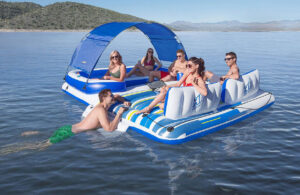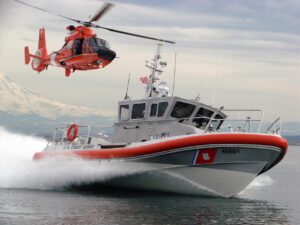You learn boating rules and regulations in boat training courses. That’s where they teach you how to keep people and boats safe while on the water. What you won’t learn in one of those courses are the hallowed and steadfast unwritten rules of the water – the unyielding, established norms. These unwritten rules dictate how to behave behind the helm, act at the dock, or in any and all boating situations. Honestly, why they’re unwritten, we don’t understand.
These unwritten rules mandate how to be courteous and respectful to everyone on the water. And as far back as boaters can remember, these rules have ruled! But how are you supposed to meet these boating standards without ever being told what they are? Most boaters acquire this knowledge through their boating communities, family members, by witnessing a violation first hand or, yikes, by being corrected by a boater who already knows these unwritten rules.
We’re not trying to rock the boat, but this doesn’t seem at all fair, does it? It’s a riddle really. If the rules of boating are unwritten, and no one has taught you, how can you still be expected to abide by them? This boating conundrum is exactly why the crew at Snag-A-Slip has put together these unwritten rules of boating (We wrote them down! Shhh!). Let us help you to not be “That Guy” or “That Gal” on the boat. Follow these few simple rules to quickly become a model captain, crew member, or passenger, and a more valuable member of the boating community.
Be prepared
If you’re captaining a boat, you should know the safety rules. These include, but are not limited to, navigating, passing, anchoring, and docking safely. If you’re even a little unsure or haven’t taken a boating safety class, sign up today. Before you do, check online for your state’s requirements. You may not know this, but more than 30 states accept online boating safety courses. One foundation, BoatUS.org, offers them for free.
Do everything expediently
Whether heading into a marina or a dock-and-dine restaurant, good boaters think ahead. They make sure that everything they do is done quickly, efficiently, and in a minimal amount of time. For example, when you tie up make sure you’re positioned so that you don’t preclude others from docking. When fueling up, be aware of other boats waiting their turn for the pump.
Educate others
Educating new crew members or passengers begins before you leave the dock. Make sure they’re familiar with where things are on the boat, including where to stand, how to move around safely and what to do if a problem arises. Actions that are second nature to boaters may seem foreign to guests. For example, explain the situations when they should sit down – like when the boat accelerates or encounters another boat’s wake. And, if not wearing life jackets, let everyone on board know where they are stored.
Know when to slow down
Whether coming in or leaving a marina, remember to keep your speed down. This is a no-wake zone, and taking it slow is the way to control your wake. If you don’t slow down, you’ll create a larger wake, causing docked boats to bang together or into the dock and pilings. You’re responsible for any damage you may cause – even inadvertently. Keeping your speed down also gives you more time to react should something cross in front of you or pop up out of the water.
Anchor far away
Always be aware of the distance between you and other boats when you anchor for the evening or just for a swim in a cove. Changes in wind, current, and tide can randomly swing your anchored boat. And of course, depending on the length of your line, your boat can drift quite far from where you originally dropped anchor.
Lend a helping hand
If you see a fellow boater struggling with a task, like tying up after pulling in to dock, offer to lend a hand. You’ll find that more often than not, a fellow boater who needs a bit of help will appreciate the extra hands.
The wave
It’s not just for royalty! No matter the size or type, greet nearby or passing vessels with a hearty wave. This friendly greeting also sends the message that you know where they are and the course they’re on. Not to mention, a friendly wave just makes everyone feel good.





